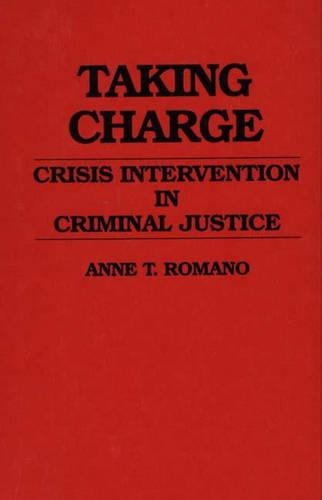
Taking Charge: Crisis Intervention in Criminal Justice
(Hardback)
Publishing Details
Taking Charge: Crisis Intervention in Criminal Justice
By (Author) Anne Romano
Bloomsbury Publishing PLC
Praeger Publishers Inc
20th March 1990
United States
Classifications
Tertiary Education
Non Fiction
362
Physical Properties
Hardback
208
Description
Over the past several years, there has been an increasing public awareness of and support for efforts to provide assistance to specially victimized groups in crisis--battered women, victims of crimes, persons with disabling diseases, and others faced with traumatic situations. Because criminal justice professionals are often the first to be in direct contact with someone experiencing these types of traumas, it is vital that they have a thorough understanding of crisis theory and of effective intervention techniques. This volume, written for police officers, auxiliary police, probation and parole agents, and correctional personnel, offers a comprehensive guide to crisis intervention within the context of the criminal justice system. Aimed at helping criminal justice professionals develop the skills necessary to diffuse and resolve a wide variety of crisis situations, the book examines specific types of crises in detail, analyzes their causes and how people react to them, and demonstrates techniques that can help the intervener take charge of situations for those persons temporarily unable to help themselves. The volume begins by discussing five major approaches to crisis intervention, showing how aspects of each can be integrated into a workable overall approach. Romano goes on to examine the characteristics of crisis situations, identifying the behaviors and the typical flow of a crisis. The chapters address specific aspects of crisis intervention including communication in life-threatening situations, the components of, and crisis intervention with victims. Interaction with such groups as the bereaved, those contemplating suicide, the elderly, victims of violence and rape, and those involved in domestic disputes each receive extended treatment. Finally, the author discusses the occupational stresses experienced by crisis interveners--problems such as intervener burnout, self-doubt, and the difficulty of maintaining emotional control. Indispensable for any criminal justice professional faced with crisis intervention responsibilities, this book should also be required reading for those aspiring to careers in this field.
Reviews
A manual for criminal justice professionals explains crisis intervention techniques and skills. Five major approaches to crisis intervention are presented to illustrate how aspects of each can be intergrated into a workable approach. The characteristics of crisis situations are examined, and the behaviors and typical flow of a crisis are identified. Aspects of crisis intervention, including communication in life-threatening situations and the components of intervention with victims, are analyzed. Interactions with such groups as the bereaved, those contemplating suicide, the elderly, victims of violence and rape, and those involved in domestic disputes, are discussed. The occupational stresses experienced by interveners-among them burnout, self-doubt and the difficulty of maintaining emotional control-are described.-Criminal Justice Abstracts
A very practical guide to relevant aspects of crisis intervention. Romano presents five conceptual models--the counselor model, the social worker model, the medical staff model, the psychologist model, and the psychiatrist model--and argues the need for an integrated approach to crisis intervention. Romano also suggests ways to improve communication skills and intervention techniques, and offers ideas for alleviating one's own stress. Victims of violence, rape, and domestic assault, as well as elderly victims, the bereaved, and the suicide-prone are discussed. The book has an excellent bibliography organized by topics, which include autoerotic death, burnout, child abuse, communication, crisis, disaster behavior, domestic violence, elder abuse, grief, male sexual abuse, rape/sexual assault, stress, sudden death syndrome, suicide, transactional analysis, and victimology. Unfortunately, the references in the text are not identified. For libraries serving undergraduate and graduate students interested in human services and the helping professions.-Choice
"A manual for criminal justice professionals explains crisis intervention techniques and skills. Five major approaches to crisis intervention are presented to illustrate how aspects of each can be intergrated into a workable approach. The characteristics of crisis situations are examined, and the behaviors and typical flow of a crisis are identified. Aspects of crisis intervention, including communication in life-threatening situations and the components of intervention with victims, are analyzed. Interactions with such groups as the bereaved, those contemplating suicide, the elderly, victims of violence and rape, and those involved in domestic disputes, are discussed. The occupational stresses experienced by interveners-among them burnout, self-doubt and the difficulty of maintaining emotional control-are described."-Criminal Justice Abstracts
"A very practical guide to relevant aspects of crisis intervention. Romano presents five conceptual models--the counselor model, the social worker model, the medical staff model, the psychologist model, and the psychiatrist model--and argues the need for an integrated approach to crisis intervention. Romano also suggests ways to improve communication skills and intervention techniques, and offers ideas for alleviating one's own stress. Victims of violence, rape, and domestic assault, as well as elderly victims, the bereaved, and the suicide-prone are discussed. The book has an excellent bibliography organized by topics, which include autoerotic death, burnout, child abuse, communication, crisis, disaster behavior, domestic violence, elder abuse, grief, male sexual abuse, rape/sexual assault, stress, sudden death syndrome, suicide, transactional analysis, and victimology. Unfortunately, the references in the text are not identified. For libraries serving undergraduate and graduate students interested in human services and the helping professions."-Choice
Author Bio
ANNE T. ROMANO is Adjunct Professor in the Department of Criminal Justice at C.W. Post College and the Department of Behavioral Sciences at Kingsborough Community College in New York. She is also the author of several books on human relations training for 911 operators and police personnel and has published articles on spouse and child abuse patterns, terrorism, drug-related homicide, and international crime patterns including espionage, drug trafficking, arms trafficking, and rebellion.
